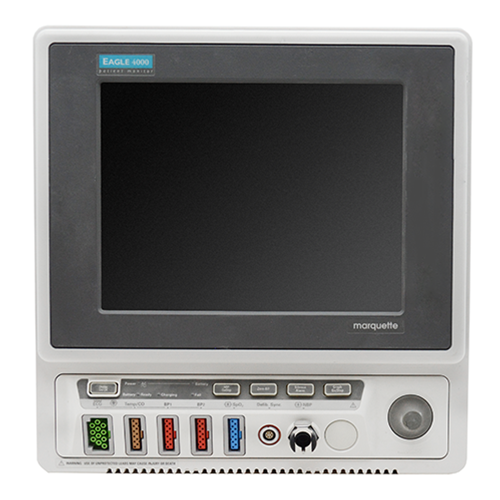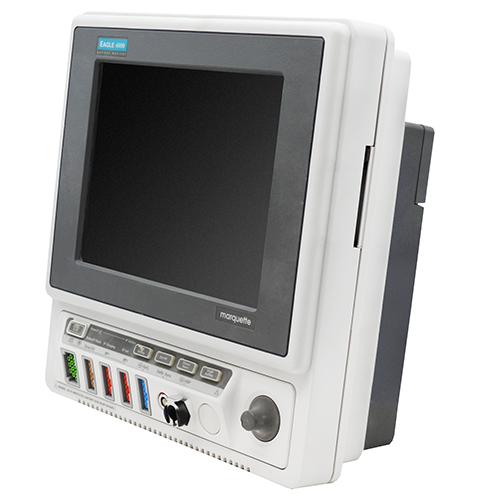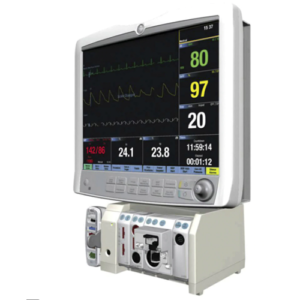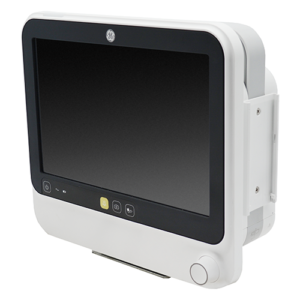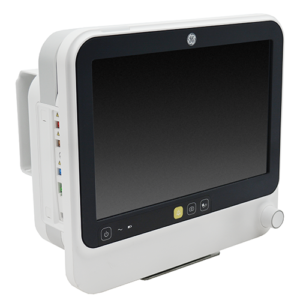“Datex Ohmeda AS/3 Compact” has been added to your cart. View cart
Description
Features:
- Customizable Monitoring: The GE Eagle 4000 patient monitor is designed to meet individual patient needs, offering basic parameters such as multi-lead ECG, non-invasive blood pressure (NIBP), SpO2, and dual temperature readings. Additional functionalities can be added to the monitor to include invasive blood pressure, EtCO2, cardiac output, respiration, 12-lead ECG analysis, and 12-lead ST monitoring.
- Comprehensive Monitoring Capabilities: The monitoring system can simultaneously display up to 6 waveforms on its 10-inch color LCD screen, providing clinicians with real-time data to make informed decisions. It supports multi-lead arrhythmia analysis and event storage and recall for comprehensive patient monitoring.
- Versatile Use: The lightweight design of the GE Eagle 4000 allows it to transition seamlessly from a bedside monitor to a transport monitor, making it suitable for both sub-acute and acute situations. Its versatility ensures continuous patient monitoring regardless of the care setting.
- Event Storage and Recall: The monitor features event storage and recall capabilities, allowing clinicians to review past data and monitor trends in patient parameters over time. This functionality aids in retrospective analysis and decision-making.
- Options for Enhanced Monitoring: Optional features include 12-lead ST monitoring and CO2 monitoring, providing clinicians with additional insights into cardiac and respiratory function for improved patient care.
GE Eagle 4000 Specifications:
- Dimensions:
- Height: 32.6 cm (12.8 inches)
- Width: 32 cm (12.5 inches)
- Depth: 14.1 cm (5.6 inches)
- Weight: 17.9 lbs
- Display:
- Size: 10.4-inch diagonal
- Type: Monochrome high-bright electroluminescent and color thin film transistor liquid crystal display
- Resolution: 640 x 480 pixels
- Number of traces: 6
- Length of trace: 6.0 at 25 mm/ sec
- Sweep speed: 25 mm/s, all waveforms except CO2
- Waveform display options: Full or individual
- Information window: Displays all non-real-time information without obstructing the display of real-time information
- Display organization: Prioritized by parameter
- Alarms:
- Classification: Crisis, warning, advisory, and message
- Notification: Audible and visual
- Setting: Default and individual
- Silencing: 1 minute, current alarm only
- Volume: Default 70%, 70 dB measured at 1 meter
- ECG:
- Leads: I, II, III, V, aVR, aVL, and aVF
- Leads analyzed simultaneously: I, II, III, and V (multi-lead mode)
- Heart rate range: 30 to 300 bpm
- Respiration:
- Measurement technique: Impedance variation detection
- Respiration rate range: 1-200 breaths per minute
- Alarms: User-selectable upper and lower limits, and user-selectable apnea limit
- Temperature:
- Channels: 2
- Range: 0°C to 45°C (32°F to 113°F)
- Resolution: ±0.1°C
- Parameters displayed: T1 and T2
- Alarms: Selectable upper and lower limits for T1 and T2
- NIBP:
- Measurement Technique: Oscillometric
- Displayed parameters: Systolic, diastolic, and mean pressures, pulse rate, time of last measurement
- Measurement modes: Manual, auto, and stat
- Heart rate detection: 30 to 300 beats per minute
- Alarms: User-selectable upper and lower limits for systolic, diastolic, and mean pressures
- Pulse Oximetry:
- Parameters monitored: Arterial oxygen saturation (SpO2) and peripheral pulse rate (PPR)
- SpO2 range: 50-100%; accuracy: ±2% (70-100%), ±3% (50-60%)
- PPR range: 20-250 bpm; accuracy: ±3 bpm
- Alarms: User-selectable upper and lower limits for SpO2 and PPR
- Power Requirements:
- 90-132 VAC 50/60 Hz; 190-264 VAC 50/60 Hz
- Power consumption: 90-132 VAC 2A; 190-264 VAC 50/60 Hz 1A

